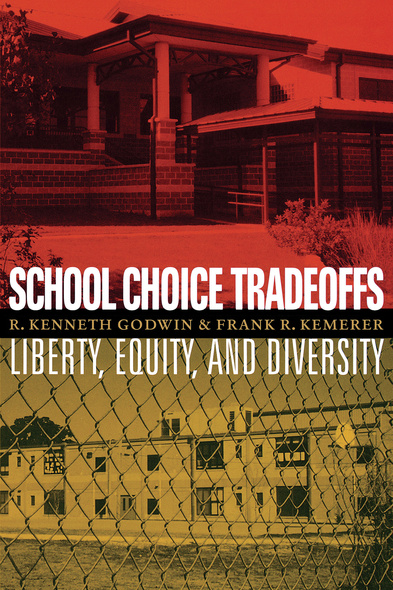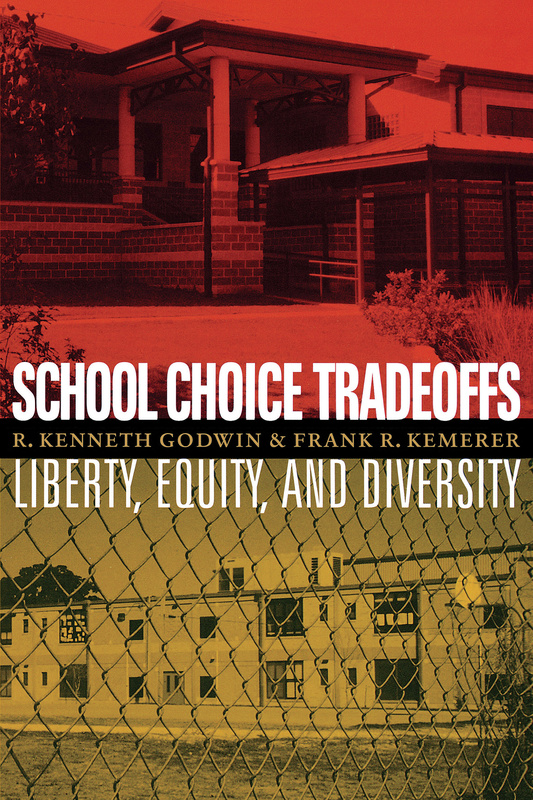School Choice Tradeoffs
Liberty, Equity, and Diversity
Educational policy in a democracy goes beyond teaching literacy and numeracy. It also supports teaching moral reasoning, political tolerance, respect for diversity, and citizenship. Education policy should encourage liberty and equality of opportunity, hold educational institutions accountable, and be efficient. School Choice Tradeoffs examines the tradeoffs among these goals when government affords parents the means to select the schools their children attend.
Godwin and Kemerer compare current policy that uses family residence to assign students to schools with alternative policies that range from expanding public choice options to school vouchers. They identify the benefits and costs of each policy approach through a review of past empirical literature, the presentation of new empirical work, and legal and philosophic analysis.
The authors offer a balanced perspective that goes beyond rhetoric and ideology to offer policymakers and the public insight into the complex tradeoffs that are inherent in the design and implementation of school choice policies. While all policies create winners and losers, the key questions concern who these individuals are and how much they gain or lose. By placing school choice within a broader context, this book will stimulate reflective thought in all readers.
This is a very strong book in an important field—possibly made all the more so by the election of Governor Bush to the Presidency and the empirical grounding of the book in San Antonio, Texas, data. . . . I am confident that the President and his advisors could learn a lot from this book, and it just could be the lever to convince the President’s team to embrace new policy details—details that might pave the way for a more widespread adoption of school choice experiments.
Godwin and Kemerer’s School Choice Tradeoffs is probably the best overview and appraisal of the school choice issue yet written. It is comprehensive in scope, acquainting readers with every important aspect of the subject, and exploring many of them in great depth. The authors pull together a vast range of scholarly literature and do an admirable job of organizing it, making sense of it, and putting it to use in building their own perspective on the issue. . . . Their treatment comes off as objective and thorough, one that readers can have confidence in and learn from.
School Choice Tradeoffs sets the issue of educational choice in a very broad context. The issues and tradeoffs are set within a carefully drawn theory of education. The authors rigorously explore the legal, social science, and policy issues surrounding choice, ending with a fascinating and detailed proposal to expand educational choice options and increase equity. This is a must-read book for any serious student of educational reform in America.
R. Kenneth Godwin is Marshall Rausch Distinguished Professor of Political Science and Public Policy at the University of North Carolina, Charlotte. Frank Kemerer is Regents Professor-Emeritus of Education Law and Administration at the University of North Texas and founder of the Texas School Administrators’ Legal Digest. He lives in San Diego, California.
- Preface
- 1. School Choice Options and Issues: An Overview
- Why Change Current Policies?
- Why Use School Choice to Promote Equity?
- Types of School Choice
- Major Issues in the Choice Debate
- Educational Outcomes
- Liberal Democratic Theory and Education Policy
- Parental Rights and Equality of Opportunity
- The Constitutionality of Vouchers and Tax Credits
- The Economics of Choice
- Accountability versus Autonomy
- Designing a Voucher Program That Promotes Equity
- 2. The Outcomes of School Choice Policies
- Why Proponents Expect Choice to Increase Academic Outcomes
- The Effects of Competition
- Increased Parental Involvement and Better Matching of Students and Schools
- Democratic Control and Bureaucratic Inefficiencies
- The Particular Problems Facing Inner-City Schools
- Why Opponents Expect Choice to Lower Academic Outcomes
- Empirical Hypotheses Concerning the Impacts of Choice
- School Choice and Segregation
- How Do Parents Choose?
- Policy Implications
- Do Private Schools Teach Public Values?
- The Effects of Choice on Teachers and Principals
- The Effects of Choice on Parents
- The Effects of Choice on Academic Outcomes
- The Effects of Competition
- Comparing Public and Private Schools
- High School and Beyond
- Results from Other National Databases
- Evaluations of Existing Choice Programs
- Privately Funded Voucher Experiments
- The Effects of Choice on Children Who Remain Behind
- Summary and Conclusions
- Why Proponents Expect Choice to Increase Academic Outcomes
- 3. Political Theory and School Choice (coauthor: Richard Ruderman)
- Liberal Democracy
- Liberal Arguments That Education Is in the Private Sphere
- Liberal Arguments for Including Education in the Public Sphere
- John Dewey and Progressive Liberalism
- Sharing Educational Responsibility: The Ideas of Amy Gutmann
- Diversity or Autonomy
- Comprehensive Liberalism versus Political Liberalism
- School Choice and Communitarian Thought
- Discussion
- Conclusion
- 4. Parent Rights, School Choice, and Equality of Opportunity (coauthor: Jennifer L. Kemerer)
- Parent Rights in Education
- How Fundamental Are Parent Rights?
- Coupling Parent Rights with Free Exercise of Religion
- Contemporary Developments
- Racial and Economic Segregation in Traditional Public Schools
- Racial Segregation
- Economic Segregation
- Continuing Inequalities in Public Schools
- Racial and Economic Inequalities in Choice Schools
- Choice Schools and Ethnic Sorting
- Racial Balance Measures
- Achieving Diversity without Unconstitutional Discrimination against Parents
- The Case for Diversity
- Proxies for Race
- Summary
- Parent Rights in Education
- 5. Vouchers and Tax Benefits: Tradeoffs between Religious Freedom and Separation of Church and State
- A Tale of Two Judges
- Judge Higginbotham and the Milwaukee Parental Choice Program
- Judge Sadler and the Cleveland Scholarship Program
- Differing Perspectives
- Vouchers, Tax Benefits, and the Federal Constitution
- Channeling Money to Sectarian Private Schools
- Channeling Money to Parents and Students
- The Significance of Federalism
- Vouchers and State Constitutions
- Restrictive States
- Prohibition on Vouchers
- No Direct or Indirect Aid to Sectarian Private Schools
- What Is "Indirect Aid"?
- Funding for Public Schools Only
- Public Purpose Doctrine
- Judicial Precedent
- Permissive States
- No Anti-Establishment Provision
- Supportive Legal Climate
- Uncertain States
- Ambiguous Constitutional Terminology
- Absence of Authoritative Case Law
- Pending State Litigation
- Restrictive States
- Implications for Voucher Program Design
- Tax Benefits
- Summary
- A Tale of Two Judges
- 6. The Economics of Choice
- Tiebout Sorting and the Median Voter Theorem
- Funding Public Schools
- Present Funding Patterns within States
- Financing Public Choice Programs
- Summary
- Promoting Efficiency in the Production of Education
- The Apparent Decline in the Efficiency of Public Schools
- Possible Reasons for the Decline in Productive Efficiency
- Changes in Student Population
- Teachers' Unions
- The Cost of Educating Students with Disabilities
- Privatization and Vouchers
- Arguments That Vouchers Will Increase the Cost of Education
- Arguments That Vouchers Will Decrease Educational Costs by Increasing Efficiency
- Regulation versus Incentives
- Regulating Class Size Reductions (CSR)
- Summary
- Equity Considerations and Voucher Policies
- The Impact of Vouchers on Public Schools
- Conclusions
- 7. School Choice Regulation: Accountability versus Autonomy
- Are Markets Preferable to Democratic Control?
- Classical Economic Theory
- New Institutional Economics
- Legal Constraints on Institutional Autonomy
- State Constitutions, State Regulation, and State Action
- Unconstitutional Delegation Law
- State Action
- State Statutes, Administrative Regulations, Charters, and Contracts
- School Choice Accountability: Michigan's Public School Academies
- State Constitutions, State Regulation, and State Action
- Lessons from Privatization of Prisons, Public Housing, and Special Education
- Privatization of Prisons
- Privatization of Public Housing
- Contracting-Out Special Education to Private Schools
- Vouchers and Private School Regulation
- Implications for Policymaking
- Are Markets Preferable to Democratic Control?
- 8. The Politics of Choice and a Proposed School Choice Policy
- Political Forces That Oppose Expanding School Choice
- Producers of Public Education and Their Organizations
- Liberal and Minority Interest Groups
- Political Forces Supporting Increased School Choice
- Attributes of an Equitable and Efficient Policy Proposal
- A Proposal to Expand School Choice
- Accountability Provisions
- Additional Measures to Assist Low-Income Students and New Scholarship Schools
- Discussion of the Tradeoffs We Made
- Vouchers for All Income Levels and a Quota for Low-Income Students
- Allowing Schools to Charge Families Additional Tuition and Fees
- Transportation
- Student Admission
- Home Schooling
- Additional Benefits and Costs of the Proposed Policy
- The Political Feasibility of the Proposed Policy
- Charter Schools and Alternative Choice Proposals
- Concluding Remarks
- Political Forces That Oppose Expanding School Choice
- Notes
- Selected References
- Index





